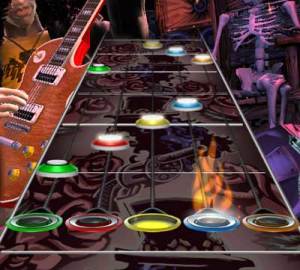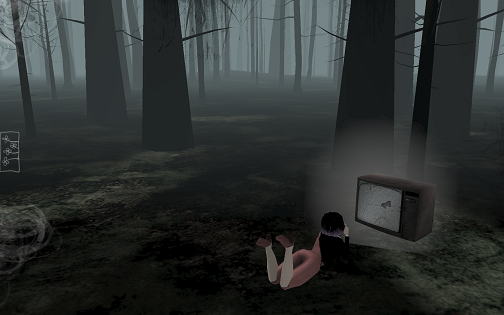Games Without Choices
2009, October 12th 4:20 PMThinking over my last entry, I've realized that – once again – I've lied to you.
Sorry. This will probably happen often.
I also plagiarized a little, but only a little.
"A good game is a series of interesting choices." It's attributed to Sid Meier, the genius behind Civilization. I am assuming you've heard of Civilization. If you haven't, get the hell out of my journal (and then come back once you've read that page.)
Sid Meier has a very specific view of gaming. Sid Meier does strategy games – turn-based strategy games, at that, where there is always a button you can press labeled "stop, I want to think for an indefinite period of time." In fact, in Sid Meier's games, usually that button doesn't exist. Instead, there's usually a button labeled "I'm done thinking, you can do things now."
In Sid Meier's games, he's completely right. Civilization without interesting choices is a terrible game.

What about Guitar Hero?
There aren't choices in Guitar Hero. Guitar Hero is a flat-out test of skill. You are either good enough or you aren't. (The actual definition of "good enough" depends strongly on the player.)
What about Braid?
There aren't really choices in Braid either. You're trying to learn how to solve the puzzles. There is no penalty for failure – you play the game inside a cheerful sandbox which is always willing to let you try again. In one sense, a random number generator could beat Braid, because it will eventually happen to solve all the puzzles . . . but it won't understand them, and that is the interesting part of Braid. Which, it must be pointed out, can only be experienced once, because then you understand it and you're done.
What about Samorost?
At first glance, Samorost may seem similar to Braid. I claim it is completely different. Samorost is not a puzzle game. There is no underlying logic to Samorost, there are no sets of rules to comprehend. Each screen is more of an experience than a level. In Samorost, the goal is the journey, not the individual puzzles – the puzzles are largely simple, but the journey is beautiful.

So I'm going to propose four rough categories.
* Strategy games, where your opponent fights you directly and must be defeated with skill and thought.
* Skill games, where your opponent is the game itself, which provides a series of increasing challenges to surpass.
* Puzzle games, where your opponent is your own limited understanding of the rules set in front of you.
* Journey games, where you have no opponent.
I'm going to have to mull on this one. Anyone got a counterexample to those four categories?


Stiltskin
2009, October 12th 6:02 PMI love The Path. :)
Guitar Hero? Well, you can choose to use your star power now or save it for later. I think it would be a little boring if it were simply a series of notes you have to hit, star power helps to mix it up. There's also choices outside of strict gameplay. You can choose which songs to play, whether or not you're ready for the next difficulty level, and so on.
Braid has plenty of choice. It's just that most of its choices don't actually go anywhere useful, don't help you to beat the level. But some do, especially…
*SPOILERS*
The ones that lead to the secret stars, which are incredibly hard to find if you don't already know where they are.
*END SPOILERS*
And then, of course there are the choices of, "This puzzle piece is too hard, let me skip it and move on". But I don't think that's quite what you're talking about.
Your categories work pretty well, methinks. But that's not to say that some of them don't have choice. Taking Super Mario Bros. as the classic example of the "skill" genre, you have plenty of choices, it's just that most of them result in your death. The guys who participated in the Mario AI competition know that especially well: http://aigamedev.com/open/interviews/mario-ai/ . It's the same in a lot of games.
soliss
2009, October 12th 8:45 PMI am happy that you included the fourth category, and would like to submit http://nifflas.ni2.se/index.php?page=1001Knytt+Stories as a possible (and beautiful) contribution to that category.
Ninwa
2009, October 13th 12:55 AMI'd like to add social games. There are games (for example, A Tale in the Desert), or Second Life, or countless other "real world simulators." These could be attributed to the Journey category, but I find that the social interaction and climb up the virtual reputation ladder becomes a huge part of the game itself, which doesn't necessarily fit any of those. I'm reminded of a game I used to play, NexusTK: Kingdom of the Winds. The game let the players run everything. At it's core, it was a very boring Korean-styled MMORPG. You walked up to an animal, pressed space bar until it died, gained experience, and then different monsters. Rinse, rather repeat. What wasn't obvious at first though was the social hierarchy that existed in the game. There were four base classes, and once you reached 99, you could join a 'subpath.' These were like an evolved version of the class. What was unique about Nexus is that these were ran by the players. Each subpath had an elder, and each elder had 12 or so council members who served under them. The elder could submit spell ideas to the Archons (GMs) and based on the subpaths standing, they would get approved. They would also be able to petition for different pieces of equipment which helped them better roleplay their class. Rangers got a special 'Wilderness Bow' for example. Also, players ran the justice system. You could be a judge. These players all had incredibly high prestige within the community. A judge could be spotted based on the kind of armor they wore, and you knew that they had been a member of the community for a long time. Other positions were event hosts (events were ran all of the time, and hosts had special GM powers to start/end the games as well as remove troubling players, they had to get these powers from the event archon.) or Army leaders, there were generals for each city who ran the army. Last there were tutors who trained players how to use the skills of their classes.
I remember spending a lot of time playing this game and climbing the ladder. I was eventually a Ranger guide (their council) and an Elixir War (glorified freeze tag) host. If you clicked on a player you could view a history of all of their accomplishments. Each path could hand out "brandings" good or bad, which stayed on your character forever in a list called your Legend.
Anyway, my point is, to me that game was entirely political. It became about making social connections and becoming a respected member of the community. While this is usually the case in most MMO's, it was emphasized in this one, and I always thought that it made it a very unique game compared to any other I played.
Zorba
2009, October 13th 1:14 AMIt's always tough talking about this sort of thing because the really good games often change dramatically based on how good you are at the game. With regard to Mario, I'm mostly talking about the fundamental gameplay of "beat the level", which, mostly, doesn't involve a lot of choice – it's "go right and don't die". When you get good at the game it does turn into an exploration game, however, which is one of its strengths :)
I'm also not counting metagame stuff, like choosing the level. That's not really playing the game – there's no wrong choice, there's no way to lose – it's really a configuration step in a lot of ways.
(alright this is slightly incorrect if you're playing sets, but whatever, it's close)
Nifflas is a genius and I love him dearly. I cannot wait for his next game, Night Game.
This is a reasonable point. I was mostly talking about singleplayer games, but I suspect you could toss The Sims into the Social Game category as well without much of a problem. EVE Online is one of those games that also changes dramatically at high levels of play – early on it's absolutely a skill game, and then it turns into a social game if you're getting into the major alliance warfare.
I shall remember that one :)
Jonathan
2009, October 13th 6:56 AMAre you proposing that the four categories are exclusive? What about something like Shadow of Destiny? Or a sandbox like Grand Theft Auto? Where do you classify that?
Zorba
2009, October 13th 7:04 AMDefinitely not exclusive. As I mentioned in the above post, some games even phase from one to the other as the player skill increases. I'll claim (largely without backing, I've already been wrong once ;) ) that all games fall into some reasonably clear subset of the five basic categories, and usually a small subset.
I haven't played Shadow of Destiny, so I can't speak to that. I'd say that GTA, depending on the player's behavior, is either Skill or Journey, with possibly a small amount of Puzzle in a few difficult missions.
Jonathan
2009, October 13th 7:17 AMAh, right. Reread the post and comments. I highly recommend Shadow of Destiny (http://en.wikipedia.org/wiki/Shadow_of_Destiny). It's probably $1 in the bargain bin at your local used-game shop. It's a really nuanced story which also "does time travel right." I think it does an interesting dance among your categories.
I guess then, also, that you'd classify multiplayer FPS as "Strategy" under this system, and single-player as some blend of "Strategy" and "Puzzle."
An interesting hypothesis on game classification, to say the least. It deserves to be put through the paces. I'll try and think of some other examples that break it.
Zorba
2009, October 14th 7:53 AMI think I really need a better definition of "strategy", as the one up there is unclear. Let's see.
Define "adversarial game" as a game where you fight an opponent, either one taking the position of "the game", or one taking the position of your nemesis/horde of monsters/opposing business manager.
"Strategy games" are adversarial games with a large branching factor on a small number of decisions, where your decisions tend to have long-term consequences.
"Skill games" are adversarial games with a small branching factor on a large number of decisions (frequently, if you want to get right down to it, precisely 60 decisions per second), where your decisions tend to have short-term consequences.
With that definition, multiplayer FPS tends to be "skill". As you move towards things like the commander's spot in the Battlefield series, it moves more towards "strategy".
Singleplayer FPS tends to be skill + puzzle.
I think I'm going to need to make a second post just to include all the errata and redefinitions from this.